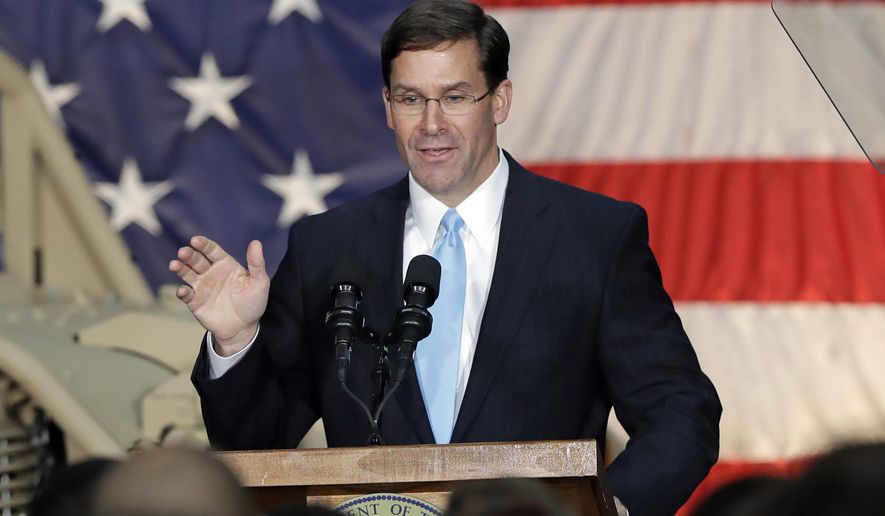WASHINGTON (AP) - It’s a perilous time to have temps running the Pentagon.
President Donald Trump’s brinkmanship with Iran is on the boil, spilling beyond diplomacy to a planned air attack on Iran that Trump said he ordered, then pulled back at least for now. This, as the U.S. undertakes an unusual troop deployment to the Mexican border , tends its nearly two-decade-old war in Afghanistan and grapples with stalled talks with North Korea over its nuclear weapons program.
Through it all, the U.S. has no defense secretary , but rather an acting one who is taking over from another acting one, who suddenly quit.
And the latest one, Army Secretary Mark Esper, who takes over Sunday, might only be able to serve as acting Pentagon chief for less than two months under the rules, requiring yet another short-term boss before it’s all sorted out. On Friday night, Trump officially announced he intended to nominate Esper for the permanent job.
Temporary leadership is a hallmark of Trump’s administration . “It gives me more flexibility,” Trump has said of the many people in acting leadership jobs, not always by his choice.
The practice lets Trump quickly, if temporarily, install allies in important positions while circumventing the Senate confirmation process, which can be risky with Republicans running the chamber by a slim 53-47 margin.
But the Senate Democratic leader, Chuck Schumer of New York, says it’s out of hand.
“With everything going on in Iran and all the provocations and counteractions, and to have no secretary of defense at this time is appalling,” he said. “It shows the chaos in this administration. They have so many empty positions, revolving doors, in the most sensitive of security positions.”
Tensions with Iran quickly escalated this week after an attack on freighters at sea that the U.S. blamed on Iran. Tehran announced it was breaking from commitments it made under the accord that restrains its nuclear ambitions - a deal Trump withdrew from last year. Iran then downed a U.S. drone, prompting Trump to order a retaliatory strike that he said he shelved 10 minutes before Iran was to be hit.
As the situation grew more dangerous this week, the acting defense secretary, Patrick Shanahan, stepped down, saying he wanted to spare his family a public airing of domestic problems linked to his messy divorce nearly a decade ago. Trump said months ago he would nominate Shanahan for the defense job and seek his Senate confirmation but he never did. Officials said repeatedly that the vetting of Shanahan was dragging on.
Trump immediately named Esper as the new acting secretary, but because of limitations laid out in court decisions and legislation governing how top vacancies are filled, he may only be able to serve for six weeks. Inside the Pentagon, lawyers are debating how to get Esper through what would be a difficult legal and congressional confirmation process. Defense officials said Thursday they had yet to find a clear way forward.
For the moment both Shanahan and Esper have been attending White House and other meetings and taking part in debates over how to respond to Iran’s destruction of the drone.
Esper is slated to take over as acting defense secretary at midnight Sunday, then head out Tuesday to a meeting of NATO defense ministers. There it will be critical for Esper to convince allies that he is now in charge, and that the U.S. national security leadership is stable and able to make decisions in crises.
While lawmakers have expressed initial support for Esper, who is well known on the Hill and previously served on committees as legislative staff, there is no guarantee he’ll get quick approval.
As a former executive at defense contractor Raytheon, Esper may have to excuse himself from decisions involving the company. That could include sensitive, top-level negotiations with Turkey over its decision to buy a Russian missile defense system, and America’s counteroffer of the Raytheon-made Patriot surface-to-air weapon.
The law prohibits Esper from being nominated for the job while also serving as acting secretary. If he is nominated, he’ll have to step down and move to another job until the Senate votes on his confirmation. So that would mean yet another acting secretary meantime.
Anyone chosen to fill in temporarily won’t have all of the decision-making power that a defense secretary needs when the nation is at war in several countries and conducting major military operations in dozens.
If the administration’s churning leadership suits Trump’s style, it’s not always his intent.
Appointments have been marked by missteps and confusion: Trump has withdrawn 63 nominees, compared with 31 pulled back by President Barack Obama at this point in his first term, according to the nonpartisan Partnership for Public Service. He’s also decided against nominating some candidates he favored after realizing the Republican-led Senate would reject them.
Altogether, 22 of the top 42 people in Cabinet jobs have been acting, or slightly over half, from the 2017 start of Trump’s presidency through mid-April, according to data compiled by incoming Yale political science professor Christina Kinane.
That’s well above the average. From the 1977 start of Jimmy Carter’s presidency through Obama’s administration, 224 people held Cabinet posts and 57 were acting, or just 1 in 4, Kinane’s figures show.
___
Associated Press writer Alan Fram contributed to this report.




Please read our comment policy before commenting.